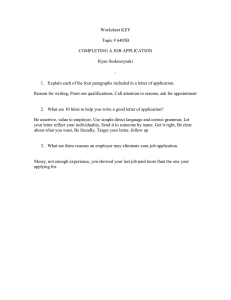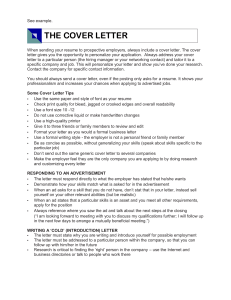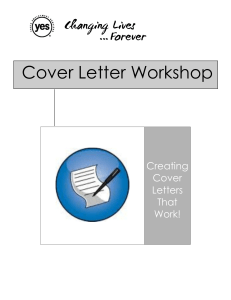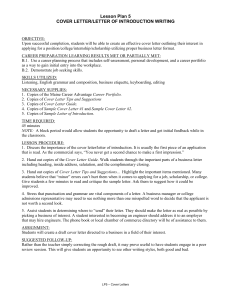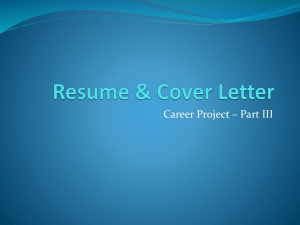Writing a Letter of Inquiry The cover letter formally introduces you
advertisement
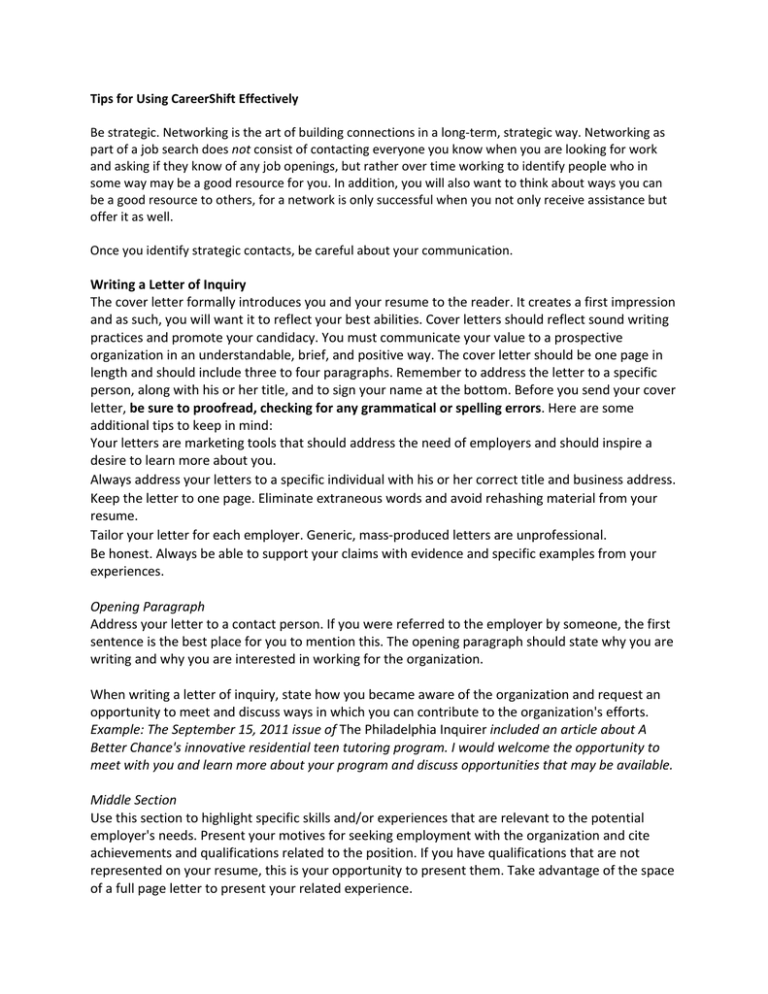
Tips for Using CareerShift Effectively Be strategic. Networking is the art of building connections in a long‐term, strategic way. Networking as part of a job search does not consist of contacting everyone you know when you are looking for work and asking if they know of any job openings, but rather over time working to identify people who in some way may be a good resource for you. In addition, you will also want to think about ways you can be a good resource to others, for a network is only successful when you not only receive assistance but offer it as well. Once you identify strategic contacts, be careful about your communication. Writing a Letter of Inquiry The cover letter formally introduces you and your resume to the reader. It creates a first impression and as such, you will want it to reflect your best abilities. Cover letters should reflect sound writing practices and promote your candidacy. You must communicate your value to a prospective organization in an understandable, brief, and positive way. The cover letter should be one page in length and should include three to four paragraphs. Remember to address the letter to a specific person, along with his or her title, and to sign your name at the bottom. Before you send your cover letter, be sure to proofread, checking for any grammatical or spelling errors. Here are some additional tips to keep in mind: Your letters are marketing tools that should address the need of employers and should inspire a desire to learn more about you. Always address your letters to a specific individual with his or her correct title and business address. Keep the letter to one page. Eliminate extraneous words and avoid rehashing material from your resume. Tailor your letter for each employer. Generic, mass‐produced letters are unprofessional. Be honest. Always be able to support your claims with evidence and specific examples from your experiences. Opening Paragraph Address your letter to a contact person. If you were referred to the employer by someone, the first sentence is the best place for you to mention this. The opening paragraph should state why you are writing and why you are interested in working for the organization. When writing a letter of inquiry, state how you became aware of the organization and request an opportunity to meet and discuss ways in which you can contribute to the organization's efforts. Example: The September 15, 2011 issue of The Philadelphia Inquirer included an article about A Better Chance's innovative residential teen tutoring program. I would welcome the opportunity to meet with you and learn more about your program and discuss opportunities that may be available. Middle Section Use this section to highlight specific skills and/or experiences that are relevant to the potential employer's needs. Present your motives for seeking employment with the organization and cite achievements and qualifications related to the position. If you have qualifications that are not represented on your resume, this is your opportunity to present them. Take advantage of the space of a full page letter to present your related experience. Example: My interest in A Better Chance stems from its mission to create and maintain programs benefiting underprivileged teenagers with a desire to complete high school and pursue a college degree. While attending Saint Joseph's University, I volunteered at the YWCA and organized an after‐ school tutoring program for 90 young women between the ages of 13 and 17. This experience strengthened my leadership, organizational, and interpersonal skills. It also solidified my interest in learning more about A Better Chance. Final Paragraph In this section state what you will do next or what you would like the recipient of the letter to do next. An assertive statement explaining what you are planning to do or what you hope the employer will do is better than a vague request for consideration. Also mention any enclosures that accompany your letter (i.e. resume, writing sample, letters of reference, a list of references). Example: I would welcome an opportunity to discuss available opportunities and my interest in contributing to A Better Chance's efforts. I will call you the week of October 11th to discuss the possibility of scheduling a convenient time for us to meet. If you would like to call me before this, I can be reached at 123‐456‐7890. Informational Interviews If you wish to conduct an informational interview to learn more about the field, send a formal written request to the person with whom you want to speak. E‐mail has also become a perfectly acceptable format for such a request. In your message, explain why you want to meet with him/her and that you will call in a week to see if an appointment is possible. Try to schedule a meeting in his/her workplace. You can learn more about the work environment and the organization’s culture through being there. Be clear that you are seeking career information, not job offers.
